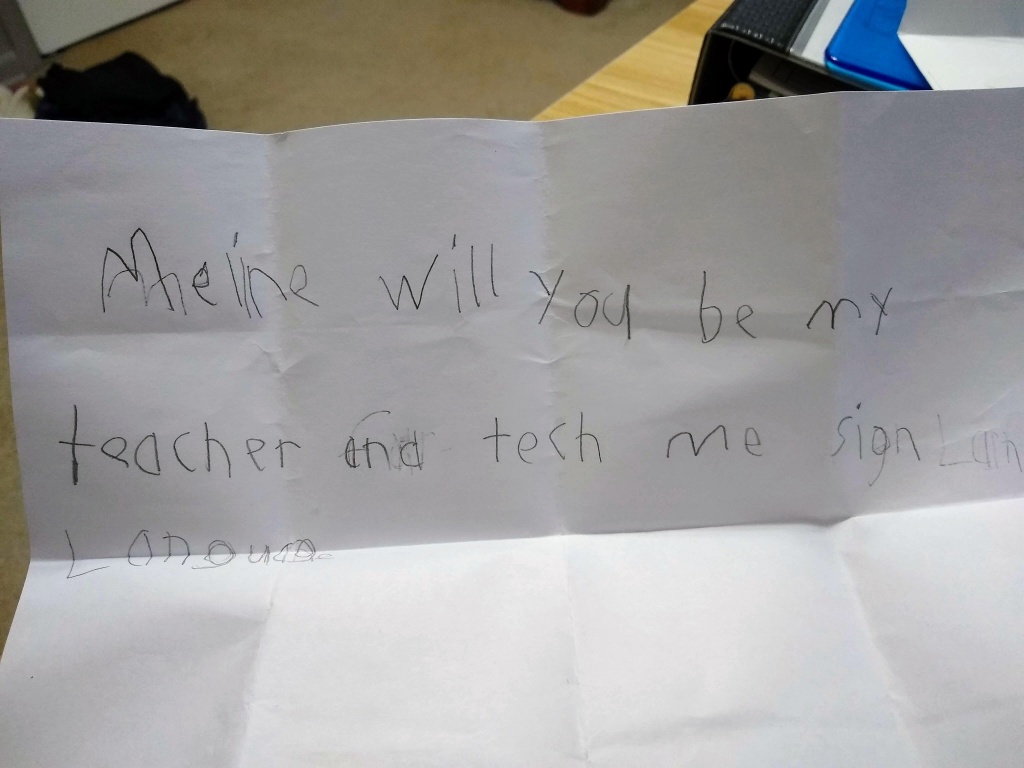An interesting moment happened last Halloween. My neighbor, a six-year-old hearing boy, came over for trick ‘r treating and then showed me the ASL alphabet. He’d learned it online, his mother said, by himself. They’re not teaching it in school. The little boy knows I am an ASL-English interpreting student, so he wanted to make a connection. I was surprised, largely because I can’t imagine myself doing anything on the internet at age six, and not only because we didn’t have home internet back then. But his drive to learn something outside of school that his parents were not also learning surprised me.
Jump ahead to this week. I received a text from the boy’s mom saying he wanted to leave me a letter in my mailbox. On the outside of the envelope, it says, “amazing” and “asom,” “cool” and “sooo cool.” Inside, here is what he wrote:

While it might be natural to think, “Awwwww,” my first thought was, “Aaaaaack.” There are a few ethical dilemmas here, and the whole situation is quite unexpected!
Firstly, there is a misconception that knowing “some signs” means that a hearing person is good at the language, which may not only be offensive to Deaf people because “some signs” denies the true linguistic and cultural value of the language, but can lead to an abuse of rights. For example, according to my former interpreting professor, who used to be a classroom interpreter, people who take two semesters of ASL will be put in classrooms to interpret for Deaf children. To compare, I have four semesters, and know my language skills are miles from proficient — and the goal is to be “near native.” In the past, if the lunch lady knew “some signs,” they would throw her into a classroom to interpret to meet the demands after the passage of IDEA.
Secondly, we’re in a place right now when we celebrate, and even think it is cute, that hearing children can sign, but deny Deaf children access to sign language. Parents work with doctors to “fix” their children and are encouraged to expose the Deaf child to English that they can’t hear and stop them from signing that they could use to learn and communicate. Do you remember the baby signing craze from about twenty years ago, sold as a way for parents to communicate with frustrating babies that throw temper tantrums? But how do I explain this to a six-year-old boy who could become an interpreter some day, and an ally? This is a short term vs. longer term dilemma, I think.
And of course, when hearing people teach ASL without the blessing of the Deaf community, they deny a Deaf person not only a job, but the hearing person makes money off of a different, and oppressed, culture.
Hypothetically, if I volunteered my time, that spirals into another ethical dilemma of whether I should volunteer my skills because they are learned and not deemed manual labor (well, yes, ASL is physical but, if you ask the average person what a “physical job” is, they’ll say construction, welding, plumber, etc.). Basically, we value manual labor as something we should pay for, and intellectual labor (for lack of a better term) as “no sweat” and thus able to be shared freely.
Volunteer or not, because I am in a position of privilege, it is ethically wrong for me to teach the neighbor boy simply because I am the first adult he knows who has studied ASL.
So, what to do? In the end I texted the boy’s mother and said that I appreciated his letter, but that it’s very important to have a Deaf teacher. I might have gone overboard explaining about hearing people getting paid to teach a different culture’s language, but it was a response I can live with. I think that’s the ultimate goal of ethics; can you live with the decision you’ve made, because no matter what you do, there are right vs. wrong and right vs. right dilemmas. I asked the mother to please tell her son that I have a Deaf teacher, and he’s very cool! I also gave her the phone number of a local agency that, I think, should be able to put her in touch with members of the Deaf community.
What are your thoughts on this situation? I acknowledge that I have made some generalizations about how Deaf people may feel in regards to hearing people teaching ASL based on interpreting classes I’ve taken, and if my generalizations are incorrect, I would be grateful for any corrections. I also want to remind readers that I am a student in an ASL-English interpreting program.
You never cease to amaze me how you work through dilemmas – and I think Sue/WG was saying the same thing recently in a (very) different situation, colonialism in SF, from memory.
I’m sure I would have said, ‘he’s keen to learn, I’ll teach him’ without thinking it through.
I hope his mother is motivated enough to find him a suitable teacher.
LikeLike
It could be easy to look at a d/Deaf person and think, “She looks like me, enjoys the same things I do, we’re from the same place” and see only sameness. However, that ignores the cultural aspect. It’s much easier to envision someone who looks unlike me. Can you imagine saying that you’ve read lots of indigenous Australian lit and thus you would be the best person to teach a class on it? I can’t imagine you choosing to do that at all. It’s the same thing with Deaf culture.
I also hope his mom follows up. She texted me back that she feels she should encourage his interest in learning a second language.
LikeLike